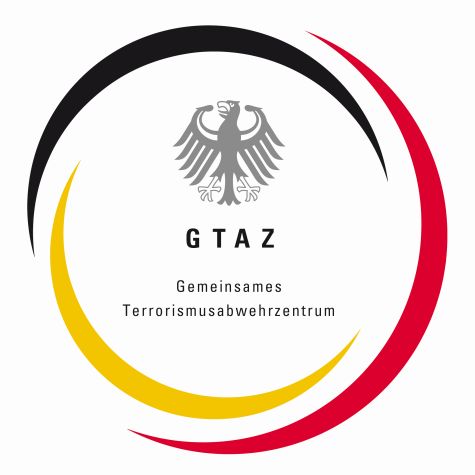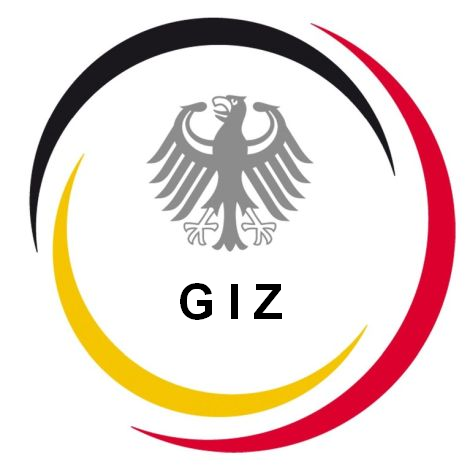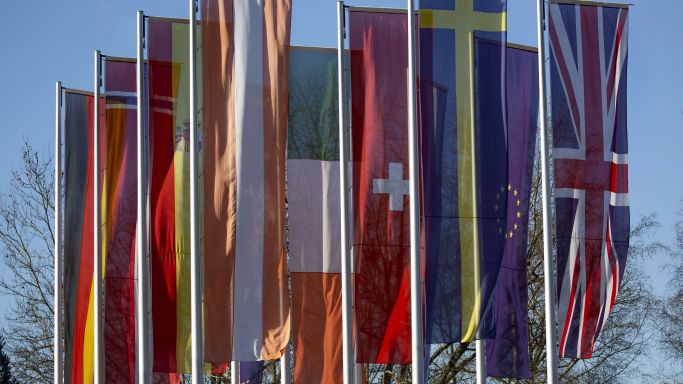National and international cooperation

In an interconnected world, societies become vulnerable and open to attack. Extremists and terrorists as well as agents of foreign intelligence services seize every opportunity to take advantage of weaknesses. The German domestic intelligence services respond by maintaining close links with national and international partners in order to safeguard the internal security of the Federal Republic of Germany.
Joint Counter-Terrorism Centre (GTAZ)

To ensure fast and direct exchange of information between intelligence and police agencies, the Joint Counter-Terrorism Centre (GTAZ) was set up in Berlin in 2004. It was established against the backdrop of an increased threat from Islamist terrorism after the terrorist attacks perpetrated by al-Qaeda in the United States on 11 September 2001.
The agencies at GTAZ
GTAZ is no independent agency but a cooperation and communication platform of the following federal and federal-state agencies:
- Federal Criminal Police Office (BKA)
- Bundesamt für Verfassungsschutz (BfV), the German domestic intelligence service at federal level
- Bundesnachrichtendienst (BND), the German foreign intelligence service
- Federal Police (BPol)
- Federal Office of Military Counter-Intelligence (BAMAD)
- Federal Office for Migration and Refugees (BAMF)
- Federal Public Prosecutor (GBA)
- Central Office of the German Customs Investigation Service (ZKA)
- 16 domestic intelligence services of the federal states
- 16 criminal police offices of the federal states
Aim and organisation
GTAZ’s main aim is to strengthen national inter-agency collaboration and to deepen cooperation with representatives of law enforcement/prosecution agencies so as to make it possible to detect and counter threats early on.
BKA, BfV and BND are jointly responsible for GTAZ’s management. GTAZ has no management team of its own and no specific law either. Instead, all the agencies involved take their measures under their own responsibility and within the framework of the laws that apply to them.
Cooperation between intelligence and police agencies is essential for successful counter-terrorism. Given the “principle of separation”, i.e. the legally prescribed separation of the police and the intelligence services, two platforms have been set up that work separately: (1) the Intelligence Information and Analysis Unit (NIAS) based at BfV and (2) the Police Information and Analysis Unit (PIAS) based at BKA.
Regular exchange of information and intelligence as well as coordination of assessments and measures regarding security-relevant matters between the two platforms take place within GTAZ’s various working groups (WG):
- WG Daily Briefing
- WG Operational Information Exchange
- WG Risk Management
- WG Cases/Analyses linked with Islamist Terrorism
- WG Islamist Terrorist Individuals
- WG Deradicalisation
- WG Transnational Aspects
- WG Accompanying Measures Concerning Legal Residence Status
- WG Intelligence Board (NIAS only)
Over the last few years, several attacks have jointly been foiled. This has proven GTAZ’s capability and efficiency. It has also highlighted the platform’s importance to the German security architecture.
Joint Counter-Extremism and Counter-Terrorism Centre (GETZ)

The Joint Counter-Extremism and Counter-Terrorism Centre (GETZ) is a communication platform for the police and the intelligence services at federal and federal state level. Its purpose is to fight right wing extremism/terrorism, left-wing extremism/terrorism and foreign extremism (excluding Islamist extremism) as well as to carry out counter-intelligence work, including counter-proliferation.
It was established based on the model of the Joint Counter-Terrorism Centre (GTAZ), whose aim is to fight Islamist terrorism. GETZ started its work on 15 November 2012. Its predecessor was the Joint Centre for Countering Right-Wing Extremism/Terrorism (GAR), which has been merged into GETZ.
The agencies at GETZ
GETZ is no independent agency but a cooperation and communication platform of the following federal and federal-state agencies:
- Federal Criminal Police Office (BKA)
- Bundesamt für Verfassungsschutz (BfV), the German domestic intelligence service at federal level
- Bundesnachrichtendienst (BND), the German foreign intelligence service
- Federal Police (BPol)
- Federal Office of Military Counter-Intelligence (BAMAD)
- Federal Office for Migration and Refugees (BAMF)
- Federal Office for Economic Affairs and Export Control (BAFA)
- Federal Public Prosecutor (GBA)
- Central Office of the German Customs Investigation Service (ZKA)
- European Police Office (Europol)
- 16 domestic intelligence services of the federal states
- 16 criminal police offices of the federal states
Aim and organisation
GETZ’s main aim is to pool the expertise of all participating agencies and to ensure that information is shared as completely and quickly as possible. GETZ has no management team of its own and no specific law either. Instead, all the agencies involved take their measures under their own responsibility and within the framework of the laws that apply to them.
GETZ is composed of the Police Information and Analysis Unit (PIAS) and the Intelligence Information and Analysis Unit (NIAS). BKA and BfV have the lead.
At GETZ, regular joint briefings take place at different intervals for all the fields concerned. In addition to these briefings, there are working groups that meet, for example, to discuss current issues in detail or that deal with topics using a project-oriented approach.
The experience at GETZ so far has shown that this cooperation platform provides clear added value to the work of all the agencies involved.
The advantages at a glance:
- shorter lines of communication
- improvement of inter-agency cooperation
- timely consolidation and assessment of information
- increased analytic capability
- easier coordination of operational measures
As an information and communication platform, GETZ ensures that the agencies can deepen their cooperation, while at the same time respecting the “principle of separation”, i.e. the legally prescribed separation of the police and the intelligence services.
Joint Internet Centre (GIZ)

Numerous extremist websites linked to Islamist terrorism can be found on the Internet. This is because on the Web, only little effort in terms of finances and manpower is required to reach an – at least potentially – wide circle of people. Thus, the Internet has become the main medium of Islamist terrorism. It serves as a propaganda and recruitment platform, to provide ideological education and as a means of internal communication in Islamist extremist networks.
To take the increasing importance of the Internet and social networks into account, the Joint Internet Centre (GIZ) was established in Berlin in 2007, based on the model of the Joint Counter-Terrorism Centre (GTAZ).
The agencies at GIZ
GIZ is no independent agency but a cooperation and communication platform of the following federal agencies:
- Federal Criminal Police Office (BKA)
- Bundesamt für Verfassungsschutz (BfV), the German domestic intelligence service at federal level
- Bundesnachrichtendienst (BND), the German foreign intelligence service
- Federal Office of Military Counter-Intelligence (BAMAD)
- Federal Public Prosecutor (GBA)
Moreover, GIZ is in permanent contact with the competent agencies of the federal states.
Aim and organisation
Propaganda is mostly spread via Islamist terrorist discussion forums and weblogs as well as relevant websites. However, radical Islamists frequently also use generally accessible Internet services like social networks and video platforms. These increasingly contain information in German. At GIZ, the security agencies of the Federation discuss the intelligence that they have obtained by monitoring, analysing and assessing Islamist extremist and jihadist content on the Internet. While doing so, they respect the “principle of separation”, i.e. the legally prescribed separation of the police and the intelligence services.
The work at GIZ essentially has the following aims:
- detecting extremist and terrorist activities on the Internet early on
- uncovering preparations for attacks
- more efficient traceability of Internet-based recruitment and radicalisation efforts
All the agencies involved have specific tasks resulting from their statutory mission. At GIZ, they jointly perform tasks, provided that this is possible and makes sense in terms of the legal framework and of workflows. Their tasks include Internet monitoring and information gathering, but also developing suitable technical tools.
Close cooperation enables the agencies involved to effectively combine their respective linguistic, technical and specialist expertise. In this way, the information obtained can be pooled in a better way and consolidated in a useful manner so as to counter threats from Islamist extremism and terrorism even more efficiently.
Counter Terrorism Group (CTG)

The Counter Terrorism Group (CTG) is an informal group of 30 European intelligence services. It works on Islamist terrorism and has an operational platform in The Hague. Its members are the domestic intelligence services and the police services with intelligence powers of the EU Member States as well as the services of the United Kingdom, Norway and Switzerland.
The group was set up in response to the terrorist attacks of 11 September 2001, following a decision made by the Council of Justice and Home Affairs Ministers of the EU on 20 September 2001.
The CTG’s tasks include
- deepening the cooperation of the domestic intelligence services in the EU,
- improving the exchange of information,
- indicating countermeasures, and
- strengthening the cooperation with EU institutions and non-European services.
The CTG does not belong to the security architecture of the European Union. Nonetheless, every six months, the intelligence service whose country has the EU Council Presidency takes the presidency of the CTG.
The CTG’s members cooperate regularly and intensively with the aim of countering terrorism. In addition to exchanging information on specific aspects of Islamist terrorism, the CTG draws up regional threat assessments and assessments on specific issues. By means of joint analysis projects focusing on the reasons for terrorism, the group moreover develops possible counter measures for the security bodies of the CTG member states.
Our partners abroad
The Bundesamt für Verfassungsschutz (BfV) cooperates with foreign partner services in various ways. This cooperation extends well beyond specific bodies like the Counter Terrorism Group and is an essential pillar in the performance of our duties.
Mutual information exchange
Extremists travel abroad to be trained in camps, foreign spies move around Europe, cyber attacks are carried out using foreign servers – it is obvious that, in an increasingly interconnected world, individuals of intelligence concern are often also involved in international extremist and terrorist structures.
Where the overt and covert collection of information reaches the limits of BfV’s statutory powers, international cooperation as an important additional source of intelligence becomes all the more significant. However, it is not only BfV that depends on information provided by the intelligence services of other states; the intelligence services of other countries also need BfV as a reliable partner. Since extremists potentially use Germany as a safe haven or transit country, intelligence collected by the German domestic intelligence services makes an important contribution to international security.
The mutual exchange of relevant intelligence with foreign partner services is subject to strict data protection regulations at all times and must always be examined on a case-by-case basis.
A central point of contact
Located in the midst of Europe, Germany is an open country with extensive international connections. These days, almost all of BfV’s fields of work include international aspects – a fact that is, of course, also reflected in BfV’s internal organisation.
The cooperation with foreign partner services in matters relating to the protection of the constitution is primarily the responsibility of BfV, which acts as the central point of contact. The domestic intelligence services of the federal states have only limited possibilities in this respect.

